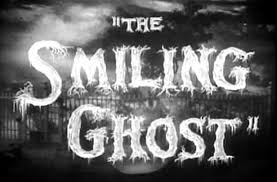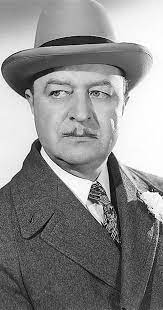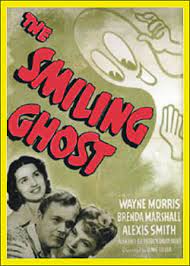The Smiling Ghost (1941 – 6 September)
IMDb meta-data is runtime 1 hour and 11 minutes, rated 6.4 by 671 cinematizens.
Genre: ODH (Old Dark House).
Verdict: Shiver and shake.

An impecunious but affable engineer agrees to fake engagement to a beauty (whose previous three fiancés have each met untimely ends). He needs the money and the eye candy is Alexis Smith. Say no more; the answer is yes!
He thinks it is some kind of a joke. If it is then it’s on him because the plan is to use him as bait to resolve the jinx, hoax, curse. Little does he know. Very little.
A theme familiar from many other silver screens is the contrasting appeals of a beautiful woman (Miss Smith above) and a feisty one. While Engineer is intoxicated by Beauty, he realises that he cares about Feisty. Often in this trope Beauty is a villain but not in this case for she herself is the victim.
In addition, Willie Best does his best, and at times is treated as a friend rather than a stereotype though the latter prevails. There is also a sixgun toting butler who later captained the Minnow.
Spoiler alert! There is a man in iron who plays a crucial part. Yes, you read that right. Indeed.
The ODH has all the spooky conveniences: Sliding panels, hidden doors, secret passages, cob webs, rubber masks, thunder and lightning, candles blowing out, an empty tomb, trap doors, revolving bookshelves, an apparition of the undead, all in all just like Delt house on Greek Row. Regrettably, it also has lacklustre direction and the wasted talent of Lee Patrick.

Earlier a perennial film milquetoast – one Chester Clute – has a moment of glory when he topples the big engineer. That was a nice touch.
Engineer Wayne Morris was an amateur flyer who in 1941, soon after the release of this movie, enlisted in the US Navy and flew combat missions in the Pacific with seven kills and five ship hits. When he returned to Hollywood his heart wasn’t in it and his career languished, while he drifted into less demanding television work, though he was superb as the broken man in Paths of Glory (1957) released two years after his death at 45 of a heart attack while attending an air show.

